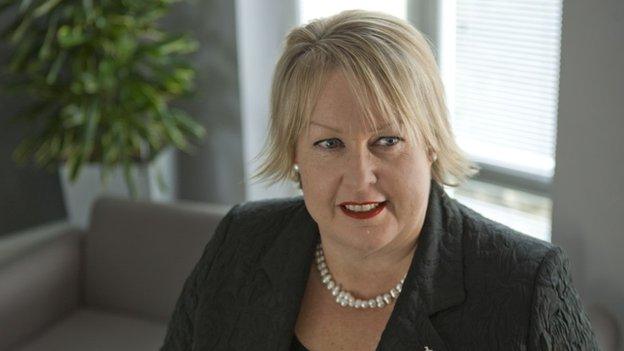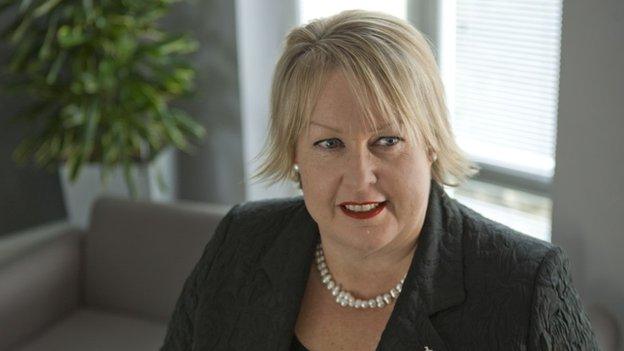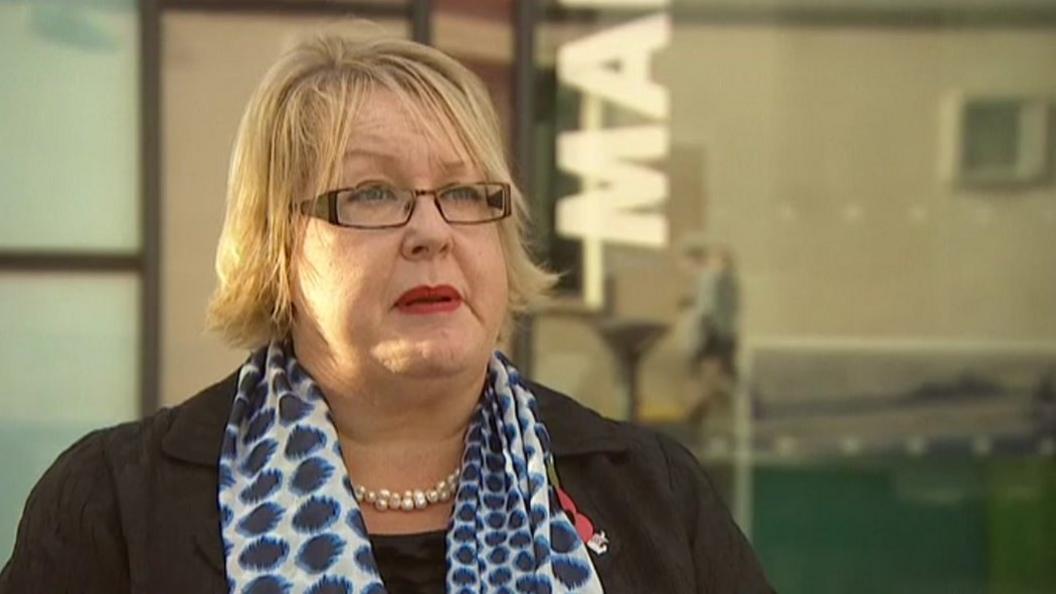Plymouth University 'in crisis' over boardroom battle
- Published

Wendy Purcell has been vice-chancellor and chief executive of the university since 2007
A power struggle at the heart of Plymouth University's boardroom has left it "in crisis", according to confidential reports to the Higher Education Funding Council (HEFCE).
University chief executive and vice chancellor Wendy Purcell was suspended from her £288,000 a year post in June.
The HEFCE has called for an independent review of governance after hearing allegations against both Prof Purcell and Chairman William Taylor.
The university has refuted the claims.
A spokesman said HEFCE had found "insufficient evidence" to investigate the complaints it had received.
'Detriment of university'
On Tuesday it released a statement saying the board of governors were "united" behind the investigation that led to Prof Purcell being suspended.
The statement also said that the HEFCE's call for a review of its governance pre-dated the vice-chancellor's suspension.
However, an HEFCE preliminary report, seen by the BBC, says one of the purposes of an inquiry would be to understand the circumstances that led to the investigation into the conduct of the vice chancellor.

Analysis: Neil Gallacher, BBC Spotlight's Business Correspondent
This gives a vivid insight into an extraordinary situation.
We now know that this breakdown in personal relationships at the top of the university has been dragging on since at least May.
The Times Higher Education publication was evidently just describing the tip of the iceberg when it pointed out last week that the degree of "senior management turbulence" seen at Plymouth is unusual for a major university, external.
Prof Purcell has not given any comments or interviews but I understand that she does still want to resume her role as vice-chancellor, in practice as well as in name.

Another purpose is to establish whether allegations about the conduct of Mr Taylor, a retired senior circuit judge for Plymouth, fall within the remit of HEFCE.
The report says the HEFCE was contacted with claims of a "governance crisis" more than two months ago.
The nature of the allegations are not revealed in the report, which says that a breakdown in personal relations between the pair "appears to have exacerbated matters to the detriment of the university".

Timeline of events
29 May 2014 - HEFCE was notified by the university of an internal investigation into the conduct of the vice-chancellor
In early June the council was contacted by the discloser about a "governance crisis" at the university and requested HEFCE's intervention
Also in early June the council received allegations about the conduct of the chairman
18 June - HEFCE head of assurance visited the university to review documentation from the discloser
2 July - it was revealed the vice-chancellor had been suspended pending a review
In July a brief report following the enquiries was prepared for the HEFCE
12 Aug - the university's board of governors said it was "united" behind the review process
Sources: Preliminary report and BBC News

Neither Mr Taylor nor Prof Purcell have responded to requests for comment.
The report recommends the university should "commission an independent external review of its governance arrangements to include lessons learned from the recent governance events".
The university has repeatedly refused to reveal the reason for Prof Purcell's suspension.
In Prof Purcell's absence, the university is being led by deputy vice-chancellor, Prof David Coslett.
Alan Qualtrough, executive member of the Plymouth Area Business Council, warned the reputational damage to the city is becoming "irreparable" and the university's standing could suffer permanent damage.
The report says that, with hindsight, the university may have been better to "commission a shorter, more focused investigation" into the complaints against Prof Purcell, rather than set up a special committee.
Mr Qualtrough said: "The special committee is known as the committee of last resort and the moment it was set up signalled the institution was in crisis.
"Yet this was not the case; Plymouth University has been an exemplar in the maritime and enterprise fields. It is a community leader, and has been rising up the rankings.
"There had to have been a better way of resolving the matter, not least because the reputational damage to the university and the city is becoming irreparable."
A university spokesman said: "The university and its board categorically refute any assertions made to HEFCE that governance at the university is 'in crisis'.
"HEFCE visited the university on 18 June and in its assessment found 'insufficient evidence' to investigate the complaints it had received.
"Furthermore, while HEFCE has recommended that it would be 'good practice' given the current circumstances for the university to conduct an external review of governance arrangements, it confirmed that the ongoing investigation of complaints against the vice-chancellor was 'properly a matter for the university and its governing body to determine'."
- Published12 August 2014

- Published5 August 2014

- Published2 July 2014
